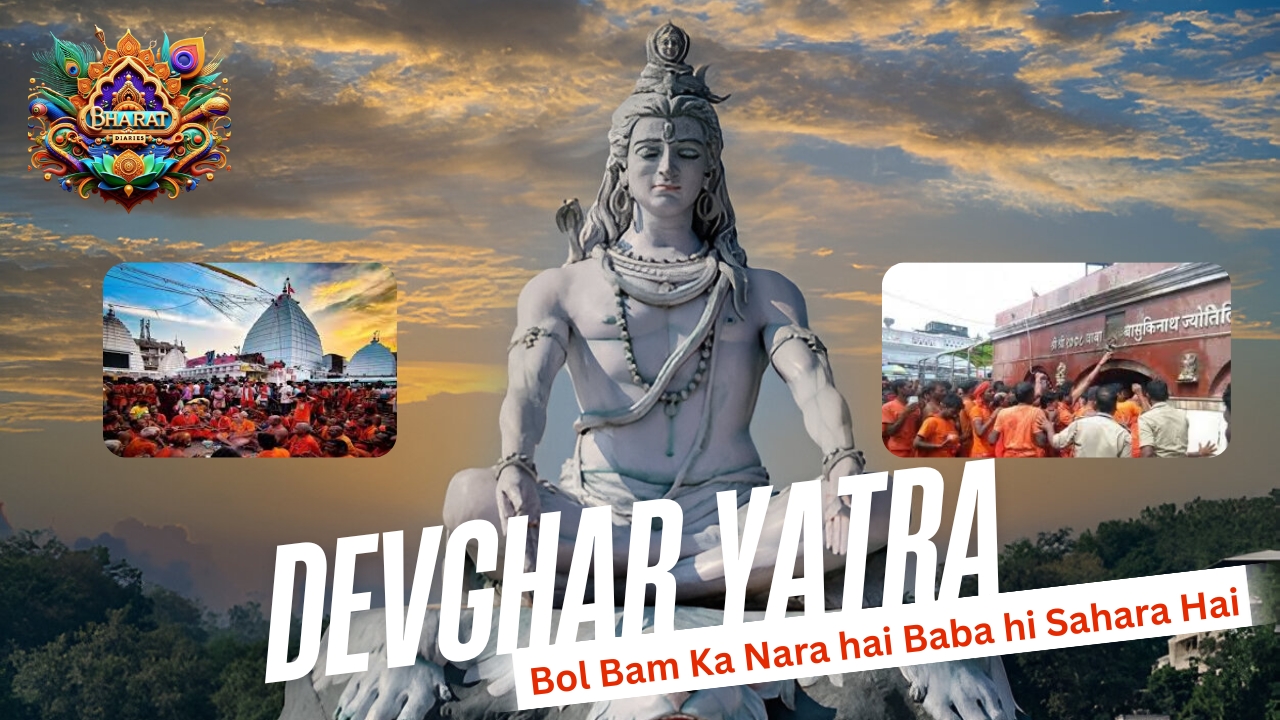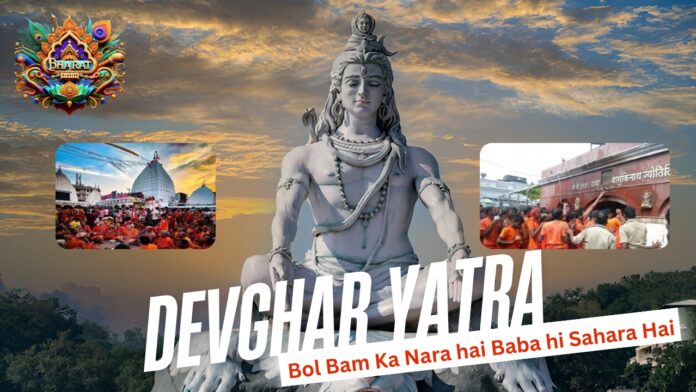
Explore the sacred Devghar Yatra during Sawan month, where lakhs offer Jalabhishek to Baba Vaidhnath and Faujdari Baba. Discover the devotion of Dak Bams.
Table of Contents
Sawan ka Mahina – Bhakti ka Samay!
Every year, during the divine month of Sawan, devotees across India offer Jalabhishek to Lord Shiva in temples both big and small. But among all the Shiva pilgrimages in India, the Devghar Yatra holds a unique place. Located in Jharkhand (formerly part of Bihar), Devghar is home to the Baba Vaidhnath Jyotirlinga, a site of immense spiritual power and historical significance.
What makes this yatra even more special is the unwavering faith and dedication of lakhs of Kanwariyas, who walk for days barefoot to offer sacred Ganga Jal to Baba Vaidhnath and Baba Basukinath, also known as Faujdari Baba.
In this blog, we take you through the spiritual essence of Devghar Yatra, the cultural vibrance of Kanwar Yatra, the legends of Dak Bams, and why this sacred pilgrimage continues to inspire millions every year.
1. The Spiritual Significance of Devghar Yatra
What is Devghar Yatra?
The Devghar Yatra is a sacred pilgrimage undertaken during Sawan (July–August). Devotees travel from Sultanganj in Bihar to Baba Vaidhnath Dham in Devghar, a distance of around 108 kilometers, to offer Ganga Jal (holy water) to the Jyotirlinga of Lord Shiva.
The word “Devghar” translates to “Home of the Gods”, and during Sawan, the entire town truly transforms into a spiritual center vibrating with devotion, bhajans, and the chant of “Bol Bam”.
https://bharatdiaries.com/jagannath-rath-yatra-odishas-grand-chariot-festival-in-puri/
2. Baba Vaidhnath: The Healing Shivling of Devghar
Who is Baba Vaidhnath?
Baba Vaidhnath is worshipped as the “Vaidh” (healer) form of Lord Shiva. According to ancient Hindu scriptures, Ravana, the demon king of Lanka, once tried to take the Shivling from Mount Kailash to Lanka. However, due to divine intervention, the Shivling got established at Devghar, making it one of the 12 Jyotirlingas.
It is believed that performing Jalabhishek here:
- Heals diseases
- Fulfills heartfelt wishes
- Removes sins of past births
3. The Kanwar Yatra: Devotion in Motion
The Journey from Sultanganj to Devghar
The yatra starts from Sultanganj, where the Ganga flows northwards (Uttarvahini) — a rare occurrence considered highly auspicious in Hinduism. Devotees collect water in kanwars (bamboo structures with pots) and begin their 108 km journey to Devghar.
Route Highlights:
- Sultanganj to Devghar: ~108 km
- Time: 3 to 7 days
- Participants: Lakhs of devotees, especially from Bihar, Jharkhand, UP, Bengal, Odisha, and even Nepal
- Common Chant: “Bol Bam! Har Har Mahadev!”
Types of Pilgrims: Understanding the Devotees
The Devghar Yatra witnesses various kinds of pilgrims, each representing a unique form of dedication. Among these, the most striking are the Dak Bams.
4. Dak Bam: The Fastest and Most Disciplined Kanwariyas
Who are Dak Bams?
Dak Bams are pilgrims who perform the entire yatra without stopping — no rest, no food, no sleep. As soon as they collect Ganga Jal from Sultanganj, they run or walk continuously until they reach Baba Dham and perform the Jalabhishek.
Key Characteristics of Dak Bams:
- Walk or run continuously without breaks
- Avoid all comforts — barefoot, no food, no rest
- Usually complete the journey within 24-36 hours
- Chant “Dak Bam! Dak Bam!” throughout the journey
- Often wear distinct saffron clothes and carry small flags or signs
Spiritual Discipline of a Dak Bam
Becoming a Dak Bam is not easy. It demands:
- High physical endurance
- Strong willpower and mental discipline
- Strict fasting rules
- Often, years of spiritual training
They believe that offering Ganga Jal immediately after collecting it enhances its power and earns instant blessings from Lord Shiva.
Respect and Reverence for Dak Bams
Among all Kanwariyas, Dak Bams are held in the highest regard. Why?
- Locals clear the road and offer seva to help them
- Volunteers provide medical aid and cooling sprays
- They’re seen as the embodiment of absolute devotion
- Many believe their mannat (wish) is more likely to be fulfilled
Other Types of Kanwariyas
| Type | Description |
|---|---|
| Kawadiya Bam | Most common, walks with breaks, completes in 3–5 days |
| Dak Bam | Walks/runs continuously without food, rest, or sleep |
| Khada Bam | Offers jal while standing – a rare and tough vrat |
| Ghoomti Kanwariyas | Use vehicles to move but perform rituals at each step |
| Parivarik Yatri | Families with elders and children, walk with more comfort and breaks |
Real-Life Example: Shyam Das, The 62-Year-Old Dak Bam
Shyam Das, from Bhagalpur, has been doing the Dak Bam Yatra for 15 consecutive years. Even at 62, he completes the journey in under 30 hours, walking barefoot with no sleep.
He says:
“Baba Vaidhnath saved my son’s life from a deadly disease. Since then, I walk for him every Sawan, as my life’s biggest prayer.”
His story is just one of the many inspiring tales that make the Devghar Yatra a spiritual marvel.
5. Baba Basukinath: The Faujdari Baba of Jharkhand
Who is Baba Basukinath?
Situated about 43 km from Devghar, the Baba Basukinath Temple is considered the “Nyayalay” (court) of Shiva and Parvati. Devotees visit here after offering Jal to Baba Vaidhnath.
Locals lovingly call him Faujdari Baba — the one who delivers divine justice.
Popular Belief:
If someone has done you wrong and you’re not getting justice in the earthly courts, just file your complaint here in front of Faujdari Baba, and the universe will set things right.
6. Rituals and Festivities at Baba Dham
Major Rituals:
- Jalabhishek: Offering Ganga Jal on the Shivling
- Rudrabhishek: Pooja with Vedic mantras, milk, honey, ghee, bel-patra
- Parikrama: Circumambulation of the temple
- Special Darshan: With digital passes or long queues
Festive Atmosphere:
- Bhajans and kirtans from loudspeakers
- Dharmshalas full of pilgrims
- Markets selling pooja items, rudraksh, saffron clothes, souvenirs
- Evening aartis with mesmerizing shankha sounds
7. Government Arrangements and Crowd Management
To manage the lakhs of devotees every day:
- Separate lanes for Dak Bams and general Kanwariyas
- Medical camps, ambulances, and emergency care
- Mobile toilets, drinking water stations
- Police deployment and drone surveillance
- Online darshan tokens and queue tracking apps
Bihar and Jharkhand governments work in close coordination to ensure safe and smooth pilgrimage during the Sawan month.
8. Local Economy and Cultural Impact
The Devghar Yatra also gives a huge boost to the local economy:
- Hotels, dhabas, pooja shops thrive during Sawan
- Thousands of temporary jobs are created in hospitality, transport, and security
- Artisans sell handmade religious items, rudraksh malas, and handicrafts
The entire region becomes a spiritual and economic hub for over a month.
9. Devghar: A Year-Round Pilgrimage Site
Though Sawan is peak season, Devghar remains busy throughout the year:
- Mahashivratri
- Shravan Mondays
- Chhath Puja
- Diwali and Holi vacations
Devotees also visit Trikuta Hills, Naulakha Mandir, and Tapovan caves for meditation and spiritual retreat.
10. Tips for First-Time Pilgrims
Planning your first Devghar Yatra? Here’s what you need:
- Train for stamina if you plan to walk
- Carry a lightweight kanwar, water bottles, first aid
- Bandages and pain relief balms for blisters
- Respect local customs and fellow devotees
- Wear saffron clothes and ID cards if in a group
- Try to pre-book lodging or dharmshalas
Conclusion: A Journey of Devotion, Discipline, and Divine Energy
The Devghar Yatra is not just a physical journey — it’s an inner awakening. Whether you’re a Dak Bam sprinting through the night, a family slowly walking together, or someone offering prayers from afar, your devotion is what truly reaches Baba Vaidhnath.
This sacred yatra is a test of body, mind, and spirit — and also a celebration of India’s cultural unity and spiritual depth.
So if the call of “Bol Bam” touches your heart this Sawan, don’t hold back. Baba Dham is waiting for you.
Har Har Mahadev! Jai Baba Vaidhnath! Jai Faujdari Baba!
